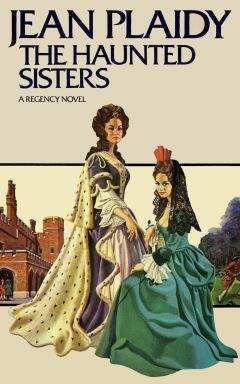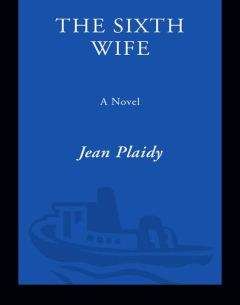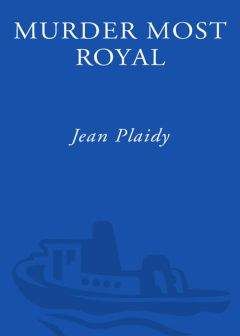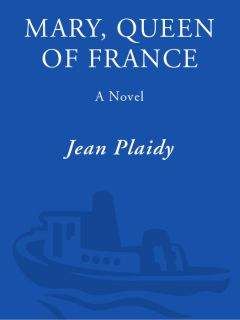Plaidy, Jean - Royal Sisters: The Story of the Daughters of James II

Скачивание начинается... Если скачивание не началось автоматически, пожалуйста нажмите на эту ссылку.
Жалоба
Напишите нам, и мы в срочном порядке примем меры.
Описание книги "Royal Sisters: The Story of the Daughters of James II"
Описание и краткое содержание "Royal Sisters: The Story of the Daughters of James II" читать бесплатно онлайн.
“He was very sad about Mary.”
“And who can wonder? When I compare the Prince of Denmark with that … monster!”
“Poor, poor Mary! Yet when we were in Holland, Sarah, she seemed happy.”
“To see you, to escape from Caliban for a while.”
“How sorry I am for her.”
“It is no use repining, Madam. Think rather of your joy. You are to have a husband with whom you are already in love …”
“But am I, Sarah? I am not sure …”
“You cannot deceive Sarah who knows you so well, Madam. If you are not already in love you are halfway there. And who can be surprised at that! This handsome hero has come across the seas to claim you. I am so happy for you, Madam.”
“It is going to be a happy marriage, is it not, Sarah?”
“The happiest at Court, Madam. You know I am always right.”
That was one thing Anne had learned. Obediently she began to fall in love with her bridegroom, and soon found it difficult to remember what Mulgrave looked like. This was so much more comfortable. George was pleasant, so eager to please; and he was kind, she could see that. Everyone was delighted at the prospect of the marriage. Her uncle wanted it; and so did her father, and when her father took her aside and asked her if she were truly happy and she told him she was, he took her into his embrace and wept over her.
“I thank God, my dearest daughter,” he told her, “for I could not have borne to see you unhappy as your sister was.”
After that she felt she owed it to them all to be happy. It was not difficult when she considered George.
There was no reason why the marriage should be delayed. The day chosen was appropriate, being St. Anne’s Day, and at ten o’clock at night in St. James’s chapel the ceremony took place. The bride was given away by her uncle the King; and afterward there was a brilliant banquet. There was rejoicing in the streets, and the sounds of music and the light from the bonfires penetrated the palace.
Another Protestant marriage! said the people, who had welcomed the Orange marriage for the same reason. James’s addiction to Catholicism was always a sore point with those who declared they would have no popery in England. Mary and Anne could well be sovereigns of England and the people had no intention of standing mildly aside while they were made into little Catholics. But there was no danger of that. Wise King Charles—always with an eye on the main chance—had decided. Not only had he taken the education of the Princesses out of their father’s hands, but he had found Protestant bridegrooms for them.
The fact that Marie Thérèse, the Queen of France, had just died, made the marriage doubly welcome. Louis, a widower in need of a wife, made a dangerous situation, for all knew that James would have been delighted to see his daughter the wife of the Catholic King of France.
But all was well; she was safely married to Protestant George; so they danced with glee around their bonfires and declared the bride to be beautiful and the bridegroom gallant while Anne and her husband sat side by side, eating heartily.
They had no qualms about each other. They were so much alike; peaceable, comfortable people, who liked to indulge the pleasures of the flesh—eating, drinking, and those yet to be discovered.
What a different bride was Anne from her shuddering sister! When the curtains were drawn about the bed by the royal hand of King Charles of England, when he made his ribald comments on the duties which lay ahead of them, Anne and George turned to each other and embraced.
Everything was natural, simple, pleasantly enjoyable without arousing ecstasy. This was symbolic of the life they would share together.
MRS. MORLEY AND MRS. FREEMAN
ow that Anne was a married woman she must have her separate household. The Duke of York did not wish her to be too far from him, and Charles, delighted with the success of the marriage and to see Anne growing happier every day, for he disliked tears and remembered those of Anne’s sister Mary—as indeed who would ever forget them?—had said the happy pair should have the Cockpit.
The Cockpit was close to Whitehall and had been built by Henry VIII as a lodge, set apart from the Palace, where he had indulged his love of cockfighting. It was a pleasant residence and Anne was enchanted with it. Close by was St. James’s Palace, where her father was often in residence; and he too was pleased to have his beloved daughter such a near neighbor; for as he said, he had but to walk across the park to visit her.
Sarah was a little disturbed, for she remained in the service of the Duchess of York and although this meant that she could see Anne frequently, now that the Princess was married, she was already on the point of relying more on her husband than on her friend.
Sarah’s was a true dilemma. Much good had come to her and John through the Duke of York; and one must not forget that he was the heir presumptive to the throne. The King had been ailing over the last year and although he was still a vigorous man, he was one who took his main pleasure no less zealously now than he had ten years before. James might soon be King of England and how much better it was to be in the service of the Queen of England than in that of a Princess who was not even next in succession.
The Duchess had been kind to Sarah over her marriage; but Anne was ready—or had been before her marriage—to take Sarah’s advice in all things.
What to do? Consult with John. John was going to be a brilliant soldier, but Sarah trusted her own diplomacy more than his. She knew that he would say: Stay as you are. We are doing well.
Relinquish Anne? It was unthinkable and yet perhaps in a few years James Duke of York would be king and Mary Beatrice of Modena queen.
When she was disturbed Sarah liked to walk alone, so she slipped on a cloak and left the Palace.
As she crossed the Park she remembered how a short while ago people used to gather there to see His Majesty play pell mell. They had said nobody could drive a ball as he did and the people would applaud when he sent his halfway down the avenue, as though, they said, it were shot from a culverin. He could no longer do that. Perhaps the game bored him; more likely he was too old.
There in the park it occurred to Sarah that momentous events were close. Greatness in people depended on their being a step or two ahead of others, in the right direction, just before it was apparent to everyone else that it was the right direction.
She had reached the streets. Very old people who remembered what it was like before the Restoration marveled at the streets of London as they were at this time. There was gaiety everywhere—if one could call painted women gay; they walked with their gallants, arms about each other, blatantly amorous. There was music from the river, drinking and dancing. How many bawdy houses were there along that short stretch of river? This was Restoration London. And how different it must have been under Cromwell and the Puritans! No theaters; no painted women; sombrely clad men; no fondling in the streets, for singing, dancing, and making love were crimes.
Change! thought Sarah. And all because the King had replaced the Protector.
She passed close to a group of people. A man was waving his arms and shouting: “No popery. Do you know what it means, my friends? You’ll smell the fires of Smithfield if we have the papists back.”
Sarah paused and listened, watching those grim determined faces.
“No popery!” It was a cry that one heard every day in the streets. The King was ailing. That was why the people so constantly shouted: “No popery!” They meant “No James!” No Catholic Duke of York should be their King.
If only one could peer into the future. It was not possible; one could only guess. But one could guess cleverly and shrewdly.
Already the Duke and his Duchess had been exiled. She thought of her beautiful dark-eyed royal mistress, Mary Beatrice of Modena with her foreign accent. She was clearly an Italian and Italians were papists.
As Sarah turned to the Palace she had made up her mind.
“Sarah,” said Anne, “you are not happy. Do not tell me you are for I know you too well.”
“I see it is no use hiding my fears from you, Madam.”
“John has been unfaithful.”
“No,” said Sarah. “Never.”
“He would not dare,” suggested Anne mischievously.
“He is too clever not to know what folly that would be.”
“Yes, he is very clever, your John; but you are not unhappy about that.”
“Oh, it is a matter which will not have occurred to you. But I have seen less of you lately.”
Anne’s face puckered into dismay. “My dearest Sarah, there has been so much to do. Being Princess of Denmark has meant so many more receptions, so many tiresome people to be received.”
“I understand that, and I know it is no fault of yours. But you noticed that I was unhappy and wanted the reason so I give it to you. I have my duties too. I must wait on the Duchess for I am after all attached to her household. How different it would be if I were attached to yours! Then … how happy I should be!”
“Sarah. But …”
Sarah took Anne’s hand and kissed it. “If I were serving you instead of the Duchess, I should always be in attendance … never far away. And now that you are reforming your household …”
“You must leave the Duchess, Sarah. You must come to me. I will confess that I had thought of it but I did not dare suggest it. For a place with the Duchess, I thought, would mean more to you than one with me.”
Sarah was almost angry in her reproaches. “You could think that, Madam! I confess I am surprised. I should have thought you would have known that there is no one I would want to serve save yourself.”
“Oh, Sarah, then it must be. I will speak to my father and stepmother. They know of the love between us two; I have no doubt that they will grant me what I ask.”
Sarah was certain now that she had acted with her usual wisdom. Every time Anne appeared in the streets the people cheered her. The Protestant marriage had endeared her to them. They were silent for the Duchess of York. Italian papist! Sarah was on the right side.
A few hours later Sarah received a letter from Anne.
“The Duke of York came in just as you were gone, and made no difficulties, but has promised me that I shall have you, which I assure you is a great joy to me. I should say a great deal for your kindness in offering it, but I am not good at compliments. I will only say that I do take it extremely kindly and shall be ready at any time to do you all the service that is in my power …”
Sarah folded the letter and put it away. She liked the terms in which it was written; they showed a proper modesty and appreciation.
Sarah swept through the apartments at the Cockpit like a cold wind. All those about the Princess Anne understood that if they wished to prosper they must placate Sarah Churchill because it was clear that, as had been the case for some time, she had more influence with the Princess than any other person. As for the Prince, he was easy enough, being completely contented with his marriage. Here he was, with an affectionate undemanding wife; all he had to do was sleep with her, a pleasant enough occupation, for he was a sensual man, but too lazy to want to hunt for his own quarry; he could eat and drink his fill, chat a little, play cards with his wife; oh, it was a pleasant life. It was true that the King dumbfounded him a little with his witty conversation, but most of this was unintelligible to Prince George and he made no attempt to understand it.
Charles said of him: “God’s fish, what have we here? I have tried him drunk and I’ve tried him sober but can make nothing of him, but the Princess Anne seems satisfied, so it may be she has been more fortunate than I.”
And when shortly after the marriage it was announced that the Princess was pregnant, Charles remarked that although his nephew by marriage seemed lacking in wit and political knowledge he had given proof of his abilities as a husband—which was all they need be concerned with.
As for Anne, she was pleased with the marriage; she grew more and more fond of George every day. He never argued with her and never made any demands on her intelligence; he was as excited by food as she was—and there were very few others who were quite so enthusiastic about it. He was teaching her how to improve the dishes by drinking the right wine; and when they went to bed, slightly intoxicated, she found marriage most enjoyable.
She assured herself that she was more sorry than ever for her poor dear Mary, and she wrote very frequently to her sister telling her of affairs in England and how she longed to visit The Hague or that Mary should come to England. Poor Mary, she had had two miscarriages and it did not seem now as though she would be pregnant again. Anne heard distressing reports from various sources in Holland. Caliban was impotent, some said; and yet from other sources came the news that he spent his nights with Elizabeth Villiers. Even so there was no news of Elizabeth’s giving birth to a royal bastard, so perhaps he was impotent after all.
Such a matter was not one to be discussed with anyone but Sarah; and as it happened it was a topic Sarah loved.
“I am indiscreet with you, Madam,” said Sarah, “though never with anyone else. And I tell you this: Caliban is incapable of begetting children. They say his asthma is terrible. I do not think he will live long. Then we hear these stories of your sister’s ague. An ailing sister, an asthmatical Orange—and let me tell you, Madam, that if your sister were to die, he would have to take a few steps back. And your father a papist! Madam, I believe that one day I shall have the honor of serving the Queen of England.”
“Oh, let be,” said Anne, “I am happy enough as I am.”
“Those who love you have ambitions for you, Madam.”
“I have always said, Sarah, that you are too ambitious.”
Sarah was alert suddenly. Was that a warning? Anne did not care to hear criticism of her father, nor did she like references to her sister’s death. Anne needed to be molded, thought Sarah.
She smiled, looking down at capable hands—an outward sign of a mind which could dominate a weaker one and was well able to do the molding.
“Not for myself, Madam,” she said more quietly than usual, “only for the one I serve with heart and soul.”
Sarah would have liked to choose Anne’s attendants. That was not possible. She did not really fear people like Lady Fitzharding and Mrs. Danvers. Mrs. Danvers occupied a minor position and was of no great importance. Lady Fitzharding had been Barbara Villiers and was a sister to Elizabeth who, rumor had it, was now the mistress of the Prince of Orange. Sarah thought she might be useful; for, it would be necessary, for the time being, to feign friendship with the Princess of Orange. There was one other, though, who was far too important in the household and this was Anne’s aunt, the Countess of Clarendon.
Подписывайтесь на наши страницы в социальных сетях.
Будьте в курсе последних книжных новинок, комментируйте, обсуждайте. Мы ждём Вас!
Похожие книги на "Royal Sisters: The Story of the Daughters of James II"
Книги похожие на "Royal Sisters: The Story of the Daughters of James II" читать онлайн или скачать бесплатно полные версии.
Мы рекомендуем Вам зарегистрироваться либо войти на сайт под своим именем.
Отзывы о "Plaidy, Jean - Royal Sisters: The Story of the Daughters of James II"
Отзывы читателей о книге "Royal Sisters: The Story of the Daughters of James II", комментарии и мнения людей о произведении.














